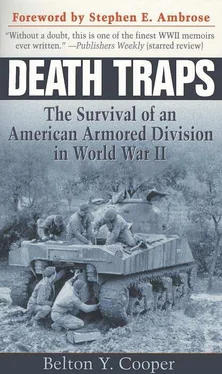We would get up at about ten o’clock in the morning and have a leisurely breakfast. The food was primarily GI 10-N-1 rations, but prepared by French chefs it certainly didn’t taste like GI chow. Omelets made with powdered eggs and powdered milk tasted like gourmet creations. I understand that adding a tablespoon of bacon grease to one quart of milk was the key to the flavor. After breakfast, we would promenade down the main avenue to view the lovely French mademoiselles. Every mademoiselle in France who could beg, borrow, or steal a ride to Cannes headed there. It did not take long for the war-weary young Americans to get acquainted with them.
One morning as Doc Martin and I walked past the Carlton Hotel, I heard a familiar voice cry out, “Hey, Cooper what the hell are you doing here?”
I immediately recognized one of my old fraternity brothers, Marshall Stringer, from Michigan. One of the first members of our fraternity to be called to active duty, he was now a lieutenant colonel in the air force and was stationed in Naples. His squadron had been downsized to one B25 bomber, a Jeep, and a master sergeant.
Stringer told me that he and the sergeant would sign the morning report in Naples on Monday morning, stash the Jeep (first having removed the wheels) in the bomb bay of the B25, and fly to Nice. The sergeant and the plane would stay in Nice, and Marshall would take the Jeep to Cannes. They would stay the entire week enjoying themselves, then fly back to Naples on Sunday night in time to sign the next Monday morning report.
This had been their routine for the last six weeks.
Marshall asked if we had met any girls. When I replied that we had not, he invited us inside to meet “the Baroness.”
We entered a small bar next to the hotel, and he introduced us to “Baroness Olga from the Volga,” a tall, handsome woman with aristocratic bearing. She was a White Russian married to a French attorney and had a beautiful villa at Cannes, where she stayed during the week. Her husband came on weekends. She appeared to be in her middle forties and spoke several languages, including perfect English.
This was the first season that the French had been allowed to return to the Riviera since the German occupation. She had come early to reclaim her prewar title as the grand dame of French society in Cannes.
Many of the mademoiselles who had come to Cannes gravitated to her, because she seemed to have the right connections to enhance their social standing.
She made a couple of phone calls, and in a few minutes a tall, good-looking redhead wearing red-and-white polka-dot shorts and a halter top rode up on a bicycle. The baroness introduced her as Ginnerret. She was a medical doctor and had worked with the French underground during the war. The baroness thought she might make a good date for Doc Martin.
A few minutes later, a beautiful, tall blonde rode up on another bicycle. In white shorts and a halter, and with golden bronze skin, she looked as though she had just stepped off the cover of Vogue magazine. Michelene would be my date. I thought I’d hit the jackpot.
We all sat down at a little table in the back and enjoyed a few drinks together. We seemed to be the envy of all the young GI lieutenants.
One afternoon we took the girls on the bus to Eden Rock, a large promontory projecting into the Mediterranean.The Breakers Hotel was located at the extreme tip of the promontory. Although it was off-limits to all but general officers, junior officers could use the pavilion next to the hotel. The pavilion was located on the upper level of the cliff and contained dressing rooms, a bar and grill, a dance floor, and an open patio looking over the beautiful blue Mediterranean. The patio was enclosed with a decorative steel railing and steps that led to lower levels. Each level contained a diving platform. From the patio we could see the bottom; although the water must have been twenty feet deep, it was crystal clear. It was the only place we were allowed to swim, because the sewage treatment facilities had been damaged during the war and raw sewage was discharged directly into the bay. Barbed-wire entanglements on the beach marked the possible site of remaining mines.
The four of us sat on the patio at a little table with a brightly colored umbrella. We were enjoying our drinks and the view, particularly the mademoiselles in their new bathing suits, the skimpiest I had ever seen. They consisted of a G-string and a minimal bra that barely covered what it was supposed to cover. The suits were flesh colored, just a shade lighter than the tanned body of the owner. Ginnerret explained that when a mademoiselle went into a store to purchase a bathing suit, she followed a strict procedure. She placed the bra over her forearm and wet it with a glass of water. When the bra darkened sufficiently to match the color of her skin, she chose that one. This meant that bathing suit shops had to carry many different shades, and that whenever a mademoiselle got a darker tan she had to come back and buy a new bathing suit. The idea was to make the mademoiselle look as though she was wearing nothing at all when she came out of the water.
Any skepticism I might have had over this explanation was erased when one of the young officers standing near the rail hollered, “There’s a naked woman lying down there on the rocks.”
There was a mad scramble as everybody rushed to the rail to see for themselves. Sure enough, on the platform about fifty feet below was a lovely young mademoiselle lying on her back apparently nude. She opened her eyes and smiled, got up, and came slowly up the stairs. When she got within about ten feet of the top, I realized that she had on a wet bathing suit. This was the beginning of the famous bikini.
Eden Rock was a beautiful resort. In the afternoons a small string combo played dance music on the patio.
One afternoon as we were sitting there, I heard a particularly lilting melody. When I inquired, I was told that the song was written by a local musician and was entitled “C’est Fini” (it is finished). The song, which became popular with the American soldiers, told about the problems of the war and the sense of relief that it was finally over.
One evening we were making the rounds of the bars along the beach. We had visited the bar at the Carlton Hotel and the Miramar, which was an air force hangout. We finally wound up in the Martinez Hotel, near the east end of the beach. This was the general routine for everybody; the more bars that were visited and the more liquor that was consumed, the more rambunctious the party became.
When the liquor flowed, the soldiers loved to brag about the heroic exploits of their particular unit.
Exaggeration increased with the number of drinks consumed until the bragging eventually degenerated into arguments about who won the war. Sometimes these became heated. When this would happen, a group of 3d Armored Division soldiers would raise their arms, bring their hands together at a point over their heads, and shout, “Just call me Spearhead and I’ll pass on through.”
One young lieutenant of the 101st Airborne became obnoxiously loud. As fer as he was concerned, the 101st Airborne had won the war almost single-handedly. Four young lieutenants from the 1st Infantry Division, one of the crack infantry divisions, finally had enough. They escorted the young airborne lieutenant off the patio.
Some thought they were taking him home and tucking him into the sack. Such was not the case.
Suddenly, there was a great commotion overhead. Each of the four 1st Infantry lieutenants had grabbed an arm or a leg of the airborne lieutenant; they were swinging him back and forth over the fourth-floor-balcony railing. At the count of four, they threw him off the balcony and screamed, “Geronimo! Fly, you S.O.B.!”
Читать дальше












